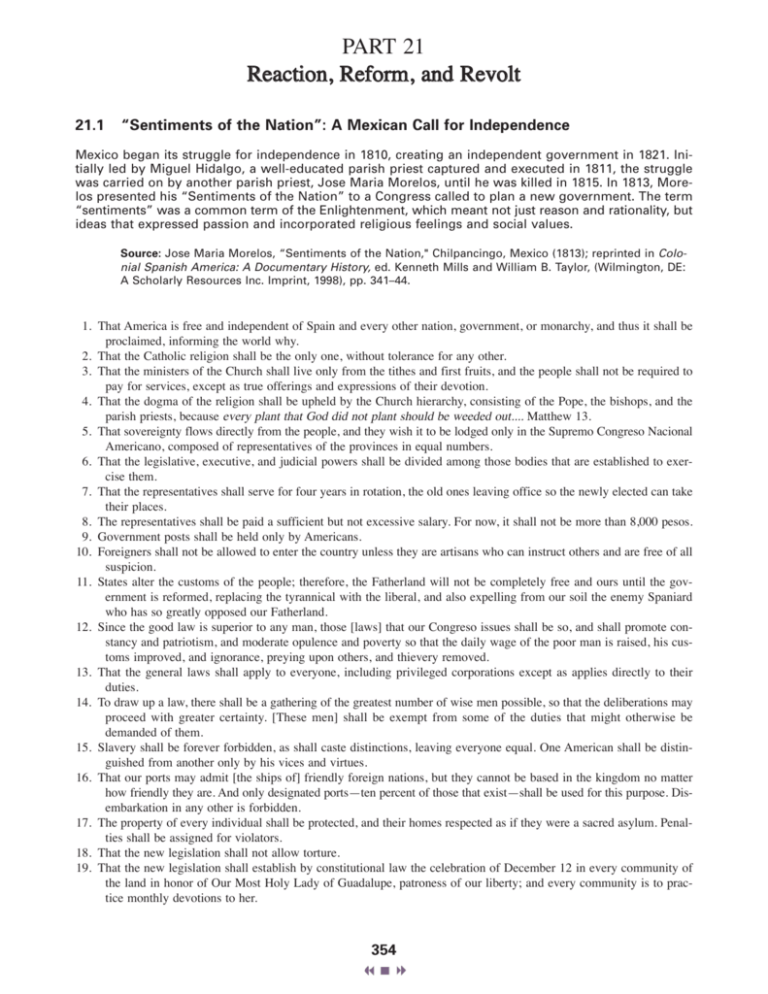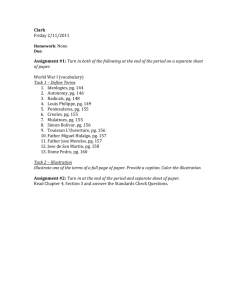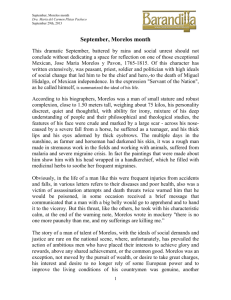Mexican Independence: Morelos' Sentiments of the Nation
advertisement

PART 21 Reaction, Reform, and Revolt 21.1 “Sentiments of the Nation”: A Mexican Call for Independence Mexico began its struggle for independence in 1810, creating an independent government in 1821. Initially led by Miguel Hidalgo, a well-educated parish priest captured and executed in 1811, the struggle was carried on by another parish priest, Jose Maria Morelos, until he was killed in 1815. In 1813, Morelos presented his “Sentiments of the Nation” to a Congress called to plan a new government. The term “sentiments” was a common term of the Enlightenment, which meant not just reason and rationality, but ideas that expressed passion and incorporated religious feelings and social values. Source: Jose Maria Morelos, “Sentiments of the Nation," Chilpancingo, Mexico (1813); reprinted in Colonial Spanish America: A Documentary History, ed. Kenneth Mills and William B. Taylor, (Wilmington, DE: A Scholarly Resources Inc. Imprint, 1998), pp. 341–44. 1. That America is free and independent of Spain and every other nation, government, or monarchy, and thus it shall be proclaimed, informing the world why. 2. That the Catholic religion shall be the only one, without tolerance for any other. 3. That the ministers of the Church shall live only from the tithes and first fruits, and the people shall not be required to pay for services, except as true offerings and expressions of their devotion. 4. That the dogma of the religion shall be upheld by the Church hierarchy, consisting of the Pope, the bishops, and the parish priests, because every plant that God did not plant should be weeded out.... Matthew 13. 5. That sovereignty flows directly from the people, and they wish it to be lodged only in the Supremo Congreso Nacional Americano, composed of representatives of the provinces in equal numbers. 6. That the legislative, executive, and judicial powers shall be divided among those bodies that are established to exercise them. 7. That the representatives shall serve for four years in rotation, the old ones leaving office so the newly elected can take their places. 8. The representatives shall be paid a sufficient but not excessive salary. For now, it shall not be more than 8,000 pesos. 9. Government posts shall be held only by Americans. 10. Foreigners shall not be allowed to enter the country unless they are artisans who can instruct others and are free of all suspicion. 11. States alter the customs of the people; therefore, the Fatherland will not be completely free and ours until the government is reformed, replacing the tyrannical with the liberal, and also expelling from our soil the enemy Spaniard who has so greatly opposed our Fatherland. 12. Since the good law is superior to any man, those [laws] that our Congreso issues shall be so, and shall promote constancy and patriotism, and moderate opulence and poverty so that the daily wage of the poor man is raised, his customs improved, and ignorance, preying upon others, and thievery removed. 13. That the general laws shall apply to everyone, including privileged corporations except as applies directly to their duties. 14. To draw up a law, there shall be a gathering of the greatest number of wise men possible, so that the deliberations may proceed with greater certainty. [These men] shall be exempt from some of the duties that might otherwise be demanded of them. 15. Slavery shall be forever forbidden, as shall caste distinctions, leaving everyone equal. One American shall be distinguished from another only by his vices and virtues. 16. That our ports may admit [the ships of] friendly foreign nations, but they cannot be based in the kingdom no matter how friendly they are. And only designated ports—ten percent of those that exist—shall be used for this purpose. Disembarkation in any other is forbidden. 17. The property of every individual shall be protected, and their homes respected as if they were a sacred asylum. Penalties shall be assigned for violators. 18. That the new legislation shall not allow torture. 19. That the new legislation shall establish by constitutional law the celebration of December 12 in every community of the land in honor of Our Most Holy Lady of Guadalupe, patroness of our liberty; and every community is to practice monthly devotions to her. 354 Part 21: Reaction, Reform, and Revolt 20. That foreign troops or those from any other [Spanish] kingdom shall not set foot on our soil unless it is to come to our aid, and then only with the authorization of the Suprema Junta. 21. That no expeditions outside the limits of the kingdom shall be made, especially not overseas expeditions; but others not of this kind are to be encouraged in order to propagate the faith among our brothers in the interior [tierradentro, or northern Mexico and the American Southwest]. 22. That the plethora of tributes, fees, and taxes that weigh us down shall be eliminated. A five percent charge on grains and other produce, or a similarly light tax, shall be levied on every individual. It shall not oppress us like the alcabala, the tobacco monopoly; the tribute, and others. With this light contribution and good administration of property confiscated from the enemy, the cost of the war and the salaries of employees can be paid. Chilpancingo, 14 September 1813. [appended Article] 23. That September 16 also shall be solemnized each year as the anniversary of the beginning of our struggle for Independence and our holy Freedom, for on that date the Nation spoke, demanding its rights with sword in hand so as to be heard. Thus the distinction of the great hero, Señor Don Miguel Hidalgo, and his companion, Don Ignacio Allende, will be remembered forever. Questions: 1. What is proclaimed or desired in this document? 2. What is the basis for the statement of rights? 3. How are these rights interpreted by the group? 355





